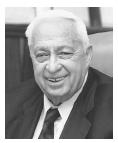ISRAEL
Ariel Sharon
Prime Minister

(pronounced "AR ee-el sha-ROWN")
"We will not rest until terrorism is eradicated…Simultaneously we will continue to do everything in our power to promote a ceasefire—one which will lead, eventually, to a settlement, an agreement, peace."
The State of Israel is located on the eastern coast of the Mediterranean Sea, bounded by Lebanon to the north, Syria to the northeast, Jordan to the east and southeast, and Egypt to the southwest. An 18 km (11 mi) strip of coastline along the Gulf of Aqaba gives Israel access to the Red Sea. Israel's boundaries were determined initially by armistice lines set following the country's war of independence in 1949; the area within these lines (the so-called "Green Line") is 22,770 sq km (7,922 sq mi).
In 1967, following war with Egypt, Syria, and Jordan, Israel acquired control of territories beyond the Green Line, including the Sinai Peninsula and Gaza Strip from Egypt, the West Bank from Jordan, and the Golan Heights from Syria. Eastern Jerusalem had been under Jordanian control between 1948 and 1967 but was annexed by Israel immediately thereafter. The Sinai Peninsula was returned to Egypt in 1982. Israel entered into an agreement with the Palestine Liberation Organization (PLO) in 1993–94. An autonomous Palestinian Authority would assume gradual control over domestic affairs in large areas of the West Bank and Gaza Strip, pending determination of the final status of those territories in negotiations between Israel and an elected Palestinian Council. Meanwhile Israel retains responsibility for some 170,000 Jews living in these territories. In addition Israel maintains full control of the Golan Heights.
The population of Israel was estimated at 6 million in 2002. This figure included more than 4 million Jews living anywhere under Israeli jurisdiction (including the West Bank, Gaza Strip, and the Golan Heights) and about 1.2 million non-Jews (including Muslims, Christians, Druze, and members of other religious groups). An additional 1.7 million non-Jews inhabited the West Bank, and more than one million lived in the Gaza Strip. The official languages of Israel are Hebrew and Arabic.
Israel has a market economy. Due to limited natural resources, however, Israel must import much of its food, fuel, and raw materials. Its historically tense relations with its neighbors have necessitated the importation of much military equipment. Exports include textiles, fruits (especially citrus), polished diamonds, pharmaceuticals, and advanced electronic equipment. Tourism, a major source of revenue, fluctuates according to the degree of civil unrest at any given time; for example, in 2001–02 following the 11 September 2001 terrorist attacks on the United States, an increase in the number of suicide bombings, and heightened tensions between Arabs and Jews in Israel led to a dramatic downturn in tourism. Israel's per capita gross domestic product (GDP) was estimated at US $19,000 in 2002. The monetary unit is the new Israeli shekel .
ADDRESS
Office of the Prime Minister
Jerusalem, Israel
Comment about this article, ask questions, or add new information about this topic: